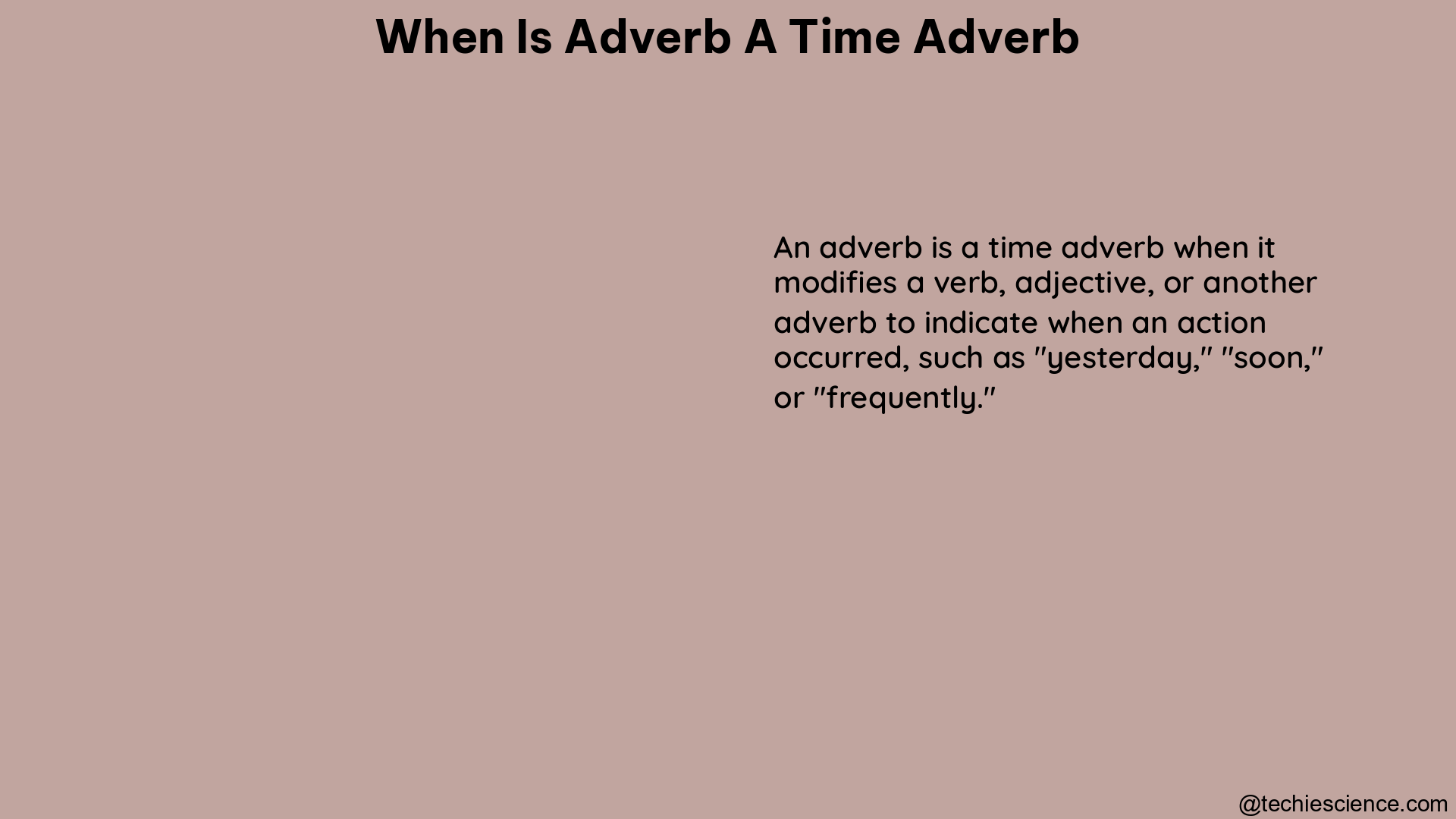An adverb is considered a time adverb when it modifies a verb, adjective, or another adverb to indicate when, how long, or how often an action takes place. Time adverbs, also known as temporal adverbs, provide information about the timing of an action, making them crucial for effective communication in English.
Adverbs That Tell Us When
Adverbs that tell us when an action happened are usually placed at the end of a sentence. Examples include:
- I saw Sally today.
- I will call you later.
- I have to leave now.
- I saw that movie last year.
Adverbs That Tell Us How Long

Adverbs that tell us how long an action lasts are also typically placed at the end of a sentence. Examples include:
- She stayed in the Bears’ house all day.
- My mom will come from Mumbai tomorrow.
Adverbs That Tell Us How Often
Adverbs that tell us how often an action happens are usually placed before the main verb but after auxiliary verbs. Examples include:
- I often eat vegetarian food.
- He never drinks milk.
- You must always fasten your seat belt.
Examples of Adverbs of Time
Some common adverbs of time include:
- Past: yesterday, last year, just, before, previously, recently
- Present: still, today, now
- Future: tomorrow, soon, next week, later.
Placement and Emphasis
The placement of adverbs of time can vary depending on the specific adverb and the desired emphasis. For example, placing an adverb at the beginning of a sentence can emphasize the time element:
- Yesterday, I and my sister visited our relatives.
Formal Context
In formal writing, adverbs of time can be placed at the beginning of a sentence before the main verb:
- Later, Goldilocks ate some porridge.
List of Adverbs of Time
Here is a comprehensive list of adverbs of time:
| Adverb | Meaning |
|---|---|
| Yesterday | Refers to the previous day |
| Today | Refers to the current day |
| Tomorrow | Refers to the next day |
| Soon | Refers to a near future time |
| Later | Refers to a future time, not necessarily immediate |
| Now | Refers to the present moment |
| Always | Refers to an action that happens every time |
| Often | Refers to an action that happens frequently |
| Daily | Refers to an action that happens every day |
| Weekly | Refers to an action that happens every week |
| Monthly | Refers to an action that happens every month |
| Yearly | Refers to an action that happens every year |
| Quarterly | Refers to an action that happens every quarter of a year |
| Annually | Refers to an action that happens every year |
| Recently | Refers to an action that happened in the recent past |
| Earlier | Refers to an action that happened before another action |
| Immediately | Refers to an action that happens right away |
| Last year | Refers to the previous year |
| Last month | Refers to the previous month |
| Last week | Refers to the previous week |
| Earlier | Refers to an action that happened before another action |
| Momentarily | Refers to an action that happens for a very short time |
| Rarely | Refers to an action that happens infrequently |
| Everyday | Refers to an action that happens every day |
| Currently | Refers to an action that is happening now |
| Then | Refers to a specific point in the past or future |
Exercises and Practice
To improve your understanding and usage of adverbs of time, practice exercises like the following:
- Fill in the blanks with the appropriate adverb of time:
- I will finish my homework _.
- She has been studying English _.
-
We will go to the movies _.
-
Identify the adverb of time in each sentence:
- I saw that movie last year.
- I will call you later.
- She stays in the Bears’ house all day.
References
- EF United States. (n.d.). Adverbs of time. Retrieved from https://www.ef.edu/english-resources/english-grammar/adverbs-time/
- GeeksforGeeks. (2023). Adverb of Time – Examples, Meaning, and Definition. Retrieved from https://www.geeksforgeeks.org/adverb-of-time/
- Twinkl. (n.d.). Adverbs of Time – Definition, Examples and Teaching Wiki. Retrieved from https://www.twinkl.com/teaching-wiki/adverb-of-time
- LanGeek. (n.d.). “Adverbs of Time” in the English Grammar. Retrieved from https://langeek.co/en/grammar/course/471/adverbs-of-time
- Byju’s. (n.d.). Adverb of Time – Explore Meaning, Definition and Examples. Retrieved from https://byjus.com/english/adverb-of-time/
Hi… I am Sowndharya Jagadeeswaran, a university rank holder in M.A. English Literature. I have also done my master’s in Business Administration. Inquisitive as I am, my interest in action-oriented research helped me publish research papers in reputed journals. Now, as a career, I am an instructor where I teach young and adorable students the intricate technicalities of Public Speaking and Creative Writing. I also enjoy writing articles on topics I specialize and research in.
You can connect with me through LinkedIn.-